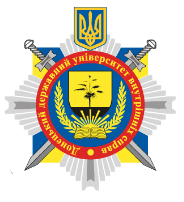THEORETICAL AND PRACTICAL PROBLEMS OF APPLICATION OF THE LAW OF UKRAINE“ON THE PROHIBITION OF PROPAGANDA OF THE RUSSIAN NAZI TOTALITARIAN REGIME, ARMED AGGRESSION OF THE RUSSIAN FEDERATION AS A TERRORIST STATE AGAINST UKRAINE, SYMBOLS OF THE MILITARY
DOI:
https://doi.org/10.32782/2523-4269-2022-81-4-1-176-180Keywords:
nazi symbols, totalitarian regime, armed aggression, forbidden symbols, propaganda, terrorist state.Abstract
The article analyzes the problems of law enforcement and the prospects for improving legal norms regarding the prohibition of propaganda of the Russian Nazi totalitarian regime, the armed aggression of the Russian Federation as a terrorist state against Ukraine, the symbolism of the military invasion of the Russian Nazi totalitarian regime in Ukraine. It is indicated that the economic sanctions against the activities of certain propagandist Russian media in response to the facts of informational aggression, which were introduced after the annexation of Crimea and the partial occupation of the Donetsk and Luhansk regions by Russia in 2014, have become a very weak tool for countering the narratives of Russian propaganda among the countries of the world. The work states that after the adoption of the Law “On the prohibition of propaganda of the Russian Nazi totalitarian regime, armed aggression of the Russian Federation as a terrorist state against Ukraine, symbols of the military invasion of the Russian Nazi totalitarian regime in Ukraine”, business representatives and legal experts had questions about the consequences of non-compliance with the provisions of this law Prohibition law. Based on a comparison of the Laws of Ukraine “On the prohibition of propaganda of the Russian Nazi totalitarian regime, armed aggression of the Russian Federation as a terrorist state against Ukraine, symbols of the military invasion of the Russian Nazi totalitarian regime in Ukraine” and “On state registration of legal entities, natural persons – entrepreneurs and public formations”, it was concluded that the use of the letters “Z” and (or) “V” in the name in itself does not mean support for the Russian military invasion and, in view of this, contradicts the Constitution and the European Convention on the Protection of Human Rights. Possible problems during the implementation of business activities by the owners of trademarks that contain the Latin letters “Z”, “V” or symbols that can be interpreted as symbols of Russian military aggression are outlined. In the absence of a common understanding of the “rightful context”, brand owners bear potential risks in using the appropriate identity and visuals of their brand.
References
Лайнбарджер П. Психологическая война. Москва : Воениздат, 1962. 350 с.
Шишкін В.І. Конституційні основи правового реагування органів державної влади на акти воєнної агресії. Вісник Конституційного Суду України. 2016. № 4–5. С. 214–222.
Александров М. Перспективи вдосконалення норм права щодо заборони публічного використання нацистської символіки. Юридичний науковий електронний журнал. С. 147–149. URL: http://www.lsej.org.ua/1_2021/36.pdf.
Аналіз закону про заборону комуністичних символів. Харківська правозахисна група. URL: https://khpg.org/1430493970 (дата звернення: 05.11.2022).
United Communist Party of Turkey and Others v. Turkey, 19392/92, Council of Europe: European Court of Human Rights, 30 January 1998. URL: https://www.refworld.org/cases,ECHR,4721cf132.html (дата звернення: 05.11.2022).





